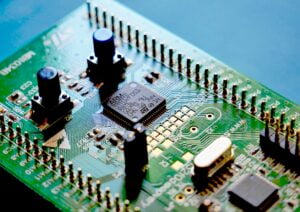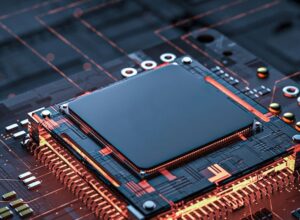In today's rapidly evolving technological landscape, host computer software development plays a crucial role in connecting complex embedded systems and user-facing applications. Host computers, often referred to as "Host Controllers," act as the central control hub in various industries, managing, controlling, and interfacing with multiple devices and systems. This guide delves into the essentials of host computer software development, covering core technologies, key functions, applications, and future trends shaping this field.
What is Host Computer Software Development?
Definition and Purpose
Host computer software development involves creating applications that run on a host computer (or host controller) to manage and control lower-level hardware systems, often referred to as embedded systems. These systems include microcontrollers, PLCs, sensors, and other devices operating within broader automated environments.
The primary purpose of host computer software is to provide a user-friendly interface for operators to monitor and control processes in real-time. It also plays a vital role in data acquisition, processing, visualization, logging, diagnostics, and remote control, making it indispensable in modern industrial and technical applications.
Core Functions
Host computer software typically serves several key functions:
- Data Acquisition: Collects data from various sources (sensors, devices) and aggregates it for processing.
- Data Processing: Processes acquired data to extract meaningful insights, often involving calculations or transformations.
- Visualization: Generates real-time graphs, charts, or dashboards for system performance monitoring.
- Control and Monitoring: Allows users to control and monitor connected systems in real-time.
- Logging and Reporting: Logs data over time for diagnostics, compliance, and reporting.
- Remote Access: Enables remote monitoring and control, crucial for distributed networks or global operations.
Systems and Applications Requiring Host Computer Software
Host computer software is integral to various systems and applications, especially in industries relying on precise control, monitoring, and data management.
Industrial Automation Systems
- SCADA Systems: Used in manufacturing, utilities, and energy industries, SCADA systems rely on host computers to act as central controllers, processing data from RTUs and PLCs and providing actionable insights.
- CNC Machines: Critical in manufacturing, CNC machines use host computer software to interpret design files and convert them into precise instructions for milling, turning, and drilling tasks.
Testing and Measurement Applications
- Laboratory Instruments: Control and automate data collection and analysis from instruments like spectrometers and microscopes.
- Environmental and Safety Monitoring: Used in industries like chemical plants and power stations to monitor safety and environmental conditions, ensuring operations remain within regulatory limits.
Energy Management Systems
- Power Plant Control: Monitors and optimizes critical parameters like temperature and pressure in power generation facilities.
- Smart Grid Management: Manages energy distribution, balancing supply and demand while integrating renewable energy sources.
Healthcare and Medical Devices
- Medical Imaging and Diagnostics: Manages and processes data from imaging devices, providing detailed visual representations for diagnosis.
- Patient Monitoring Systems: Tracks vital signs in critical care environments, providing real-time alerts and enabling prompt interventions.
Technologies in Host Computer Software Development
Developing host computer software requires a range of technologies, from programming languages to communication protocols, tailored to the specific application's needs.
Programming Languages
- C/C++: Used for performance-critical applications requiring direct hardware interaction, ideal for industrial automation and embedded systems.
- Python: Favored for rapid prototyping, scripting, and data processing, with extensive libraries for numerical computation and data manipulation.
- Node.js: Popular for cross-platform applications due to its non-blocking, event-driven architecture, suitable for scalable and efficient systems.
Development Frameworks
- Qt: A leading framework for cross-platform GUI development, favored for its robustness and scalability in industrial applications.
- Electron: Enables cross-platform desktop applications using web technologies, ideal for modern, responsive user interfaces.
- Visual Studio: A powerful IDE supporting multiple languages and frameworks, particularly well-suited for Windows environments and enterprise-level applications.
Communication Protocols
- Serial Communication (RS-232, RS-485): Reliable methods for connecting host computers to embedded devices, widely used in industrial environments.
- Ethernet and TCP/IP: Backbone of modern networked communication, enabling high-speed data transfer across distributed systems.
- CAN Bus: A robust protocol used in automotive and industrial applications, ideal for real-time communication in harsh environments.
Benefits of Integrated Host Computer and Embedded System Development
Seamless Communication and Data Flow
Integrated development ensures seamless communication between the host computer and embedded systems, minimizing latency and reducing the risk of communication errors. This is crucial in real-time applications like industrial automation or medical devices.
Simplified Development and Maintenance
A unified development environment streamlines the process, reducing the learning curve and simplifying maintenance. Changes can be implemented across the system efficiently, leading to reduced downtime and lower long-term costs.
Scalability and Adaptability
Modular design approaches enhance scalability, allowing easy expansion and adaptation to new requirements or emerging technologies. This is particularly valuable in rapidly evolving industries.
Enhanced Reliability and Performance
Integrated development improves overall system reliability and performance, reducing compatibility issues and ensuring the system operates at peak efficiency. Rigorous testing and validation further enhance performance and safety.
Future Trends in Host Computer Software Development
AI and Machine Learning Integration
AI and machine learning are becoming increasingly important in host computer software, especially for predictive analytics, process optimization, and anomaly detection. These technologies enable systems to learn from data, identify patterns, and make decisions autonomously.
Edge Computing
Edge computing processes data closer to the source, reducing latency, improving response times, and enhancing data security by keeping information local. This trend is gaining traction in distributed systems like IoT networks and smart grids.
Increased Focus on Cybersecurity
With increasing interconnectedness, cybersecurity is a top priority. Advanced security measures, such as encryption and secure communication protocols, are essential to protect systems from cyber threats. Real-time breach detection and response capabilities are also becoming critical.
IoT Expansion and Industry 4.0
The rise of IoT and Industry 4.0 drives the need for software that can manage and control vast networks of connected devices. Host computer software will play a pivotal role in integrating these devices, supporting advanced automation, data analytics, and smart manufacturing processes.
User Interface Innovations
As systems become more complex, the need for intuitive, user-friendly interfaces grows. Developers are focusing on creating advanced GUIs that provide clear, real-time information and easy-to-use controls. Technologies like augmented reality (AR) and virtual reality (VR) offer new possibilities for immersive, interactive interfaces.
Cloud Integration
Cloud integration allows host computers to interface with cloud-based services, enabling remote monitoring, data analytics, and system management. While offering scalability and flexibility, it also introduces challenges like data security and latency, necessitating a balanced approach with local processing.
Advanced Analytics and Big Data
The integration of advanced analytics tools in host computer software is increasingly important. Predictive analytics and real-time data processing enable organizations to make informed decisions, optimize performance, and ensure operational continuity.
Human-Machine Interface (HMI) Evolution
Modern HMIs must offer advanced GUI design, providing clear data presentation and intuitive control. AR and VR technologies can enhance these interfaces, offering immersive environments for more effective system interaction.
Host computer software development is at the core of modern industrial and technical systems, providing essential tools for monitoring, controlling, and optimizing complex processes. As industries continue to evolve, the role of host computer software will only grow in significance, driven by trends such as AI integration, edge computing, advanced analytics, and enhanced cybersecurity. By embracing these trends and investing in integrated development approaches, organizations can ensure their systems remain efficient, scalable, and secure in an increasingly connected world.
The future of host computer software is bright, with new technologies and methodologies continually emerging to address the challenges of modern systems. Whether through the adoption of cloud platforms, the development of sophisticated HMIs, or the integration of AI-driven analytics, the ongoing evolution of host computer software will continue to empower industries, driving innovation and enhancing productivity across a wide range of applications.

